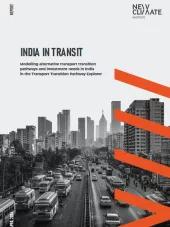Supporting a just transition in Mexico needs reliable finance estimates
Achieving a just transition of the power sector requires financing across various dimensions. These include the phase out of fossil fuel infrastructure, renewable energy build‑out, the just transition of workers, communities, and regions, as well as the development of institutional frameworks. While under the principle of common but differentiated responsibilities under the UNFCCC framework industrialised countries need to act first, all countries need to achieve net zero greenhouse gas (GHG) emissions by 2050 in order to limit global warming to 1.5°C. This requires the phase out of all unabated fossil fuel‑based power generation in that timeframe. To successfully achieve this, developing and emerging economies will require international financial support. A detailed understanding of investment and finance needs is essential to inform government planning and to support emerging climate finance partnerships for countries’ low‑carbon transitions, but sophisticated methods for developing them are largely missing.
With the growing number of Just energy transition partnership (JETP) processes initiated in recent years, the development of methodologies for estimating finance needs for a just transition has increased in importance. While the discourse to date has mainly centred around the phase-out of coal, fossil gas has received less attention and has even acquired a reputation as a “sustainable” bridging fuel in some forums. But to achieve net zero GHG emissions by 2050, unabated fossil-gas will also have to be phased out. With the Mexican power sector heavily reliant on fossil gas, the early retirement of some fossil gas capacity becomes an important part of achieving this target as much as the cancellation of already planned capacities. Financial compensation for potential economic losses may be justified for such early retirements.
Fossil gas phase out, build-out of green infrastructure and a social just transition at the focus
This paper explores potential economic compensation needs for the early retirement of fossil gas plants in Mexico. It estimates the finance needs for the build-out of clean infrastructure, especially renewable energy capacity, required to meet the growing demand for electricity and to replace phased out fossil fuel‑based capacities. Finally, it discusses what is needed to quantify the finance needs for the social just transition of workers, communities, and regions.
Financing renewables as a priority, caution on compensation for the early retirement of fossil gas, and a country-driven approach to a social just transition
Our analysis suggests that all new power plant capacity in Mexico should be entirely renewables-based, both from an economic as well as Paris Agreement‑compatibility perspective. New renewable capacity would deliver cheaper electricity compared to new fossil gas‑based capacity. The build-out of new renewable energy capacity will require investments of around $180 bln USD between 2023 and 2030, as well as between 2030 and 2040. For the period from 2040 to 2050, the required amount is reduced to about half. Such build-out needs to be supported by the expansion of the electricity grid with between $10 and $160 bln USD between 2023 and 2030, but the absence of more detailed grid build-up plans challenges the production of reliable figures. The cost competitiveness of renewable energy could be further strengthened through low-cost (concessional) financing.
The finance needs estimates for the early retirement of fossil gas‑based power plants differ significantly based on how the problem is approached. Data availability and accessibility is a major hurdle in estimating financial compensation needs at the power plant level, but using simplified methods can lead to a significant overestimation of compensation needs, risking generating windfall profits for fossil gas plant owners. But the data required to make appropriate calculations is almost always confidential. This report indicates that compensation needs for the early retirement of fossil gas‑based power capacity could range from negative values (indicating an economic gain from replacing existing fossil gas fired power plants with new renewables) to around $9 bln USD. An alternative approach where the electricity generation cost of existing fossil gas‑based power plants is compared to the electricity generation cost of newly added renewable energy capacity indicates that compensation payments could be significantly reduced or even eliminated depending on how the price of fossil gas develops. That could allow companies to switch their business models and refocus on renewables without worsening their economic situation.
As the needs for a just transition for workers, communities, and regions is highly influenced by context specific aspects, there are no sophisticated methods applicable on a universal level. Countries and regions have adopted varied strategies, but international experiences highlight certain common elements. First, active engagement of affected stakeholders has been a key part of just transition efforts. Secondly, a combination of top‑down coordination and funding, coupled with bottom‑up identification and implementation of measures, has proven effective in supporting the transition of workers and communities. Thirdly, the regional context is crucial; Thus, supporting a socially just transition requires a tailored approach specific to each country and sub‑national region. While funds supporting regional transitions often follow pledge and review processes, initial finance needs could be estimated with stakeholder input, focussing on priority areas for intervention. Internationally, several types of funds have been established that could also be considered in Mexico. These include transition funds that focus on regional restructuring, social transition funds targeting vulnerable groups such as indigenous communities and/or compensation funds that directly address affected workers. Incorporating such funding into just transition plans at state and/or national levels would be essential to ensure the success of a socially just transition in Mexico.
Integrate finance and investment needs calculations with country‑driven stakeholder processes
It is important to further advance the evidence base for just transition investment and finance needs in Mexico’s energy sector and beyond. The further development of different approaches to estimate and quantify such needs lays an important foundation for political discourses in Mexico and internationally. It is critical to accompany such analytical efforts with deeper stakeholder engagement and political processes at both national and regional levels. A just transition can only be successful if all perspectives of those affected are considered and political compromises can be negotiated in a fair and transparent way.





